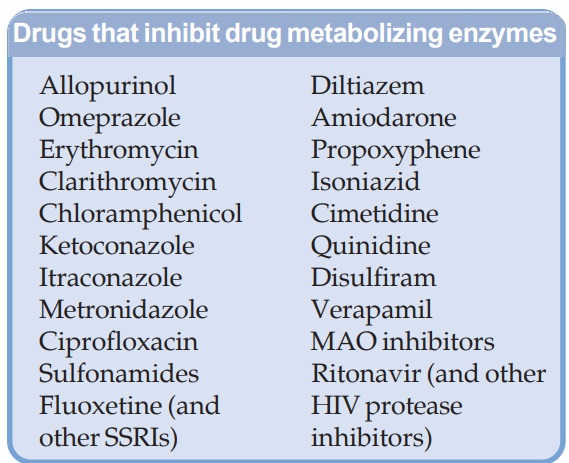Inhibition of Drug Metabolism
| Home | | Pharmacology |Chapter: Essential pharmacology : Pharmacokinetics; Metabolism Excretion Of Drugs, Kinetics Of Elimination
One drug can competitively inhibit the metabolism of another if it utilizes the same enzyme or cofactors. However, such interactions are not as common as one would expect, because often different drugs are substrates for different cytochrome P450 isoenzymes. It is thus important to know the CYP isoenzyme(s) that carry out the metabolism of a particular drug.
INHIBITION OF DRUG METABOLISM
One drug can competitively inhibit the metabolism of another if
it utilizes the same enzyme or cofactors. However, such interactions are not as
common as one would expect, because often different drugs are substrates for
different cytochrome P450 isoenzymes. It is thus important to know the CYP
isoenzyme(s) that carry out the metabolism of a particular drug. A drug may
inhibit one isoenzyme while being itself a substrate of another isoenzyme, e.g.
quinidine is metabolized by CYP3A4 but inhibits CYP2D6. Also most drugs, at
therapeutic concentrations, are metabolized by nonsaturation kinetics, i.e. the
enzyme is present in excess. Clinically significant inhibition of drug
metabolism occurs in case of drugs having affinity for the same isoenzyme,
specially if they are metabolized by saturation kinetics or if kinetics changes
from first order to zero order over the therapeutic range (capacity limited
metabolism). Obviously, inhibition of drug metabolism occurs in a dose related
manner and can precipitate toxicity of the object drug (whose metabolism has
been inhibited).

Because enzyme inhibition occurs by direct
effect on the enzyme, it has a fast time course (within hours) compared to
enzyme induction (see below).
Metabolism of drugs
with high hepatic extraction is dependent on liver blood flow (blood flow limited
metabolism). Propranolol reduces rate of lidocaine metabolism by decreasing
hepatic blood flow. Some other drugs whose rate of metabolism is limited by hepatic
blood flow are morphine, propranolol, verapamil and imipramine.
